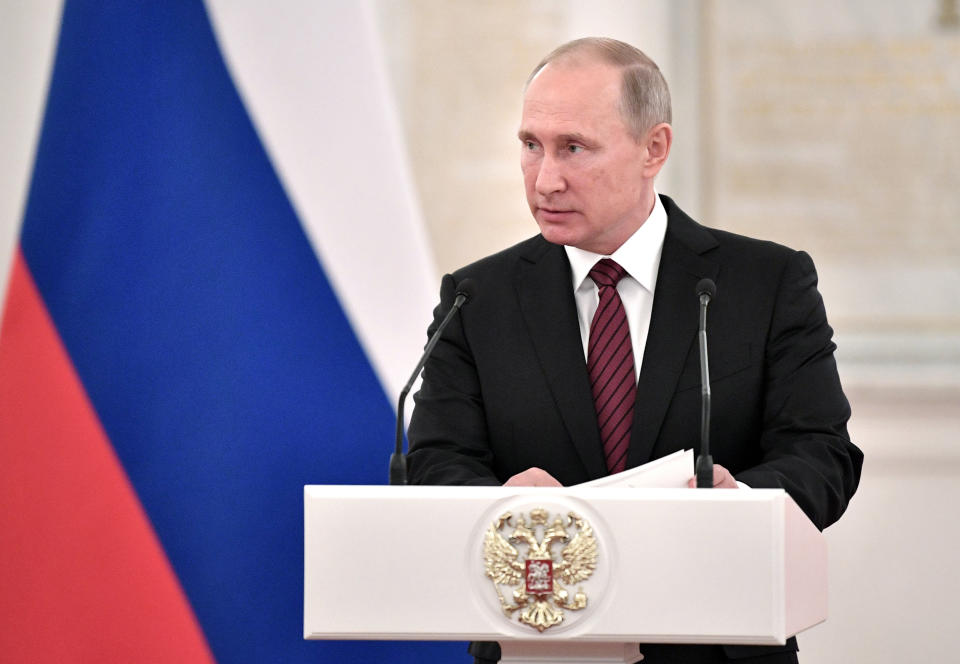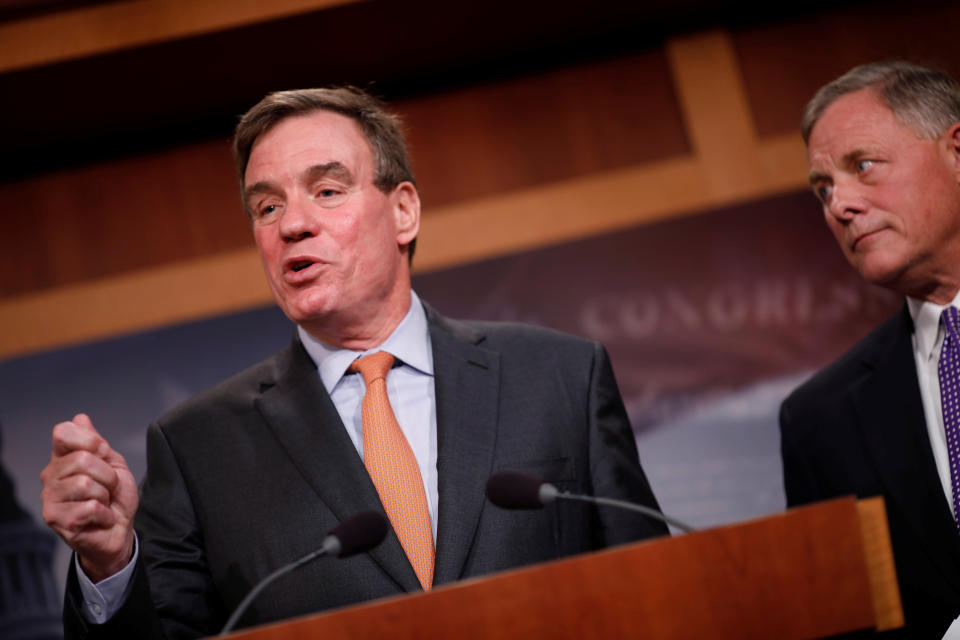Twitter cracks down on ads by Russian news sites RT and Sputnik

WASHINGTON — Twitter announced today that it will ban advertising from RT and Sputnik, two news organizations owned by the Russian government that U.S. intelligence officials have linked to the Kremlin’s influence campaign in the 2016 election.
The move, which was immediately denounced by Russian officials, is the strongest step yet taken by any U.S. social media company to attempt to curb the influence of Russian state propaganda on its platforms.
It comes just a week before executives from Twitter, Facebook and Google are to testify before the Senate Intelligence Committee, where they are expected to face sharp criticism over their failure to police more aggressively covert Russian messaging aimed at U.S. audiences.
“This decision was based on the retrospective work we’ve been doing around the 2016 U.S. election and the U.S. intelligence community’s conclusion that both RT and Sputnik attempted to interfere with the election on behalf of the Russian government,” the company said in a blog post. “We did not come to this decision lightly, and are taking this step now as part of our ongoing commitment to help protect the integrity of the user experience on Twitter.”
The two Russian companies are not banned from tweeting on the site, just from purchasing advertising to promote their content.
Shortly after Twitter announced the decision, Sputnik published an article quoting Maria Zakharova, the spokeswoman for Russia’s foreign ministry, describing the move as an “aggressive step, prompted by the pressure from US intelligence services, aimed at blocking the activities of Russian media.”
RT’s editor in chief, Margarita Simonyan, responded to Twitter’s announcement with a statement warning that American news outlets operating in Russia could face a crackdown as a result of the move.
“I never thought that Twitter is under the control of the US security services — it seemed like a conspiracy theory. But now Twitter appears to have admitted it,” Simonyan said to a Russian state-owned news agency. “This is highly regrettable. It is particularly regrettable that now US media operating in Russia will feel the tender response of the Russian authorities.”
Earlier this month, Russian President Vladimir Putin said American outlets in his country would face a response “in kind” if Russian news organizations faced pressure in the United States.
“There will immediately be an answer,” Putin said.

Simonyan and RT also published proposals they claim to have received from Twitter encouraging the company to buy advertising on the social media platform. In a tweet aimed at Twitter CEO Jack Dorsey, Simonyan wrote on Twitter:
“Hope @jack won’t forget to tell @congressdotgov how@Twitter pitched @RT_com to spend big $$s on US elex ad campaign.” https://twitter.com/M_Simonyan/status/923519609269116928
Asked to respond, a Twitter spokesperson said via email that the company would not comment “on our private conversations with any advertiser, even a former advertiser.” A source familiar with the company’s dealings with RT said: “These kinds of conversations are industry standard pitching for any potential advertiser. It’s the job of any ad sales team to aggressively recruit and retain clients, and sometimes they use strong language in order to do so.” The spokesperson also noted that only “a very small slice” of Twitter’s communications with RT was being shown, adding that the Russian network’s “motivations may not be full transparency of our advertising relationship.”
An RT spokesperson, asked for comment, referred reporters to the post about Twitter’s attempts to sell advertising on the site, but had no further comment.
The announcement from Twitter comes less than two weeks after Yahoo News published an in-depth report based on thousands of internal documents that detailed the inner workings of Sputnik. The emails showed how Sputnik staffers were instructed to promote the Kremlin’s agenda, and how some former staffers feared they were being used to gather intelligence for Moscow. Yahoo News has also reported that Sputnik and RT are both under investigation by the Department of Justice for possible violations of the Foreign Agents Registration Act, a 1938 law requiring anybody engaged in foreign propaganda in the United States to register with the Justice Department.
Twitter’s announcement offered little insight into how and why it reached its decision now, other than to say that it had conducted an “internal investigation.” It did cite a report by the U.S. intelligence community in January that named RT and Sputnik as key players in Russia’s campaign to interfere in the 2016 U.S. presidential election.

“Early this year, the U.S. intelligence community named RT and Sputnik as implementing state-sponsored Russian efforts to interfere with and disrupt the 2016 Presidential election, which is not something we want on Twitter. This decision is restricted to these two entities based our internal investigation of their behavior as well as their inclusion in the January 2017 DNI report,” Twitter’s blog post said.
Along with blocking ads from RT and Sputnik, Twitter pledged to take money it has earned from RT and use the funds to finance research into the company’s role in politics.
“Twitter has also decided to take the $1.9 million we are projected to have earned from RT global advertising since they became an advertiser in 2011 … and donate those funds to support external research into the use of Twitter in civic engagement and elections, including use of malicious automation and misinformation, with an initial focus on elections and automation,” the company’s blog post said.
Sputnik spokeswoman Beverly Hunt told Yahoo News that the outlet never ran advertising on Twitter.
“Sputnik has never used paid ads for promotion on Twitter. Sputnik news channels are followed by people who are tired of the mainstream media and who are looking for a fresh perspective on the news,” Hunt said.
The Twitter advertising ban on RT and Sputnik comes as social media companies face mounting criticism on Capitol Hill. After a private briefing from Twitter executives last month, Virginia Sen. Mark Warner, the ranking Democrat on the intelligence committee, said the company’s efforts to curb Russian propaganda were “deeply disappointing” and “inadequate on every level.”
Today, Warner called Twitter’s announcement “a positive step towards restoring the public’s trust.” Sen. Jeanne Shaheen, D-N.H., said: “Twitter’s decision to remove RT and Sputnik advertising from their platform is a necessary step in narrowing the ability of the Kremlin to misinform and aggravate the general public. I hope other companies will follow this lead.”
But Clint Watts, a former FBI agent who tracks Russia messaging on social media, called it “too little, too late” and questioned how effective it could be. He noted that most Russian propaganda is not through outright ads, but through automated bots and trolls, which often masquerade as American users and are difficult to trace.
“This is partly a PR move,” said Asha Rangappa, another former FBI agent who has investigated Russian propaganda efforts and is now an associate dean of the Yale Law School. “They’ve been under a lot of pressure. But I don’t think it’s a long-term solution.”

_____
Read more from Yahoo News:
64 hours in October: How one weekend blew up the rules of American politics
Behind Flake’s decision to bow out of Senate, a disillusioning, disheartening year
San Juan mayor calls for canceling ‘alarming’ contract for Puerto Rican power repairs
Photos: Revisiting the assassination of JFK, as the last files are opened


